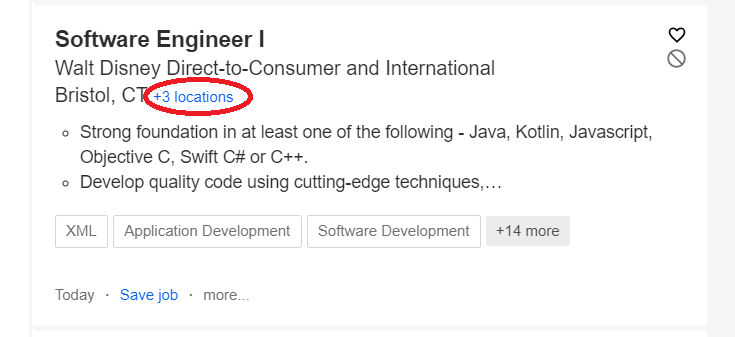Finding Work Opportunity in a Town Without It
If you’re stuck somewhere that makes it hard finding work opportunity, there is another way. What if I told you there’s this mirror realm, similar to the fabled realm of faery folk or a sci-fi parallel universe, in which you can work towards such riches you seek… work that’s unavailable in your podunk town? You must take care not to fall into its thrall and be lost forever, but there are some cool upsides to it without you ever uprooting your life.
That realm exists. That realm is actually where I exist for you, right now. That realm is the wonderful world of the far-reaching and powerful INTERNET.
“Duh, Darcy. You’re not slick. I’ve looked for jobs there too and haven’t found anything that pays better.”
That might be because you don’t know how to find the good ones. I’ll help you out.
Identify Which Job Posting are Remote
First off, you’re going to pay more attention to bigger companies than smaller ones – the bigger the corporation, the more likely they are to allow remote work. Larger companies are a better bet for these type of roles than smaller companies, where they overwhelmingly prefer your physical presence over remote performance. The only times I’ve heard of full-time remote work for a small business was when an employee worked there for several years and had gained the owner’s complete trust. Definitely look to larger companies, preferably those with a national presence and at least 200 employees. Tech-focused companies are more likely to say yes to remote work and already have infrastructure in place to allow it.
Once you know which companies to focus on, look out for a job posting listing several places you can work from. Because that position clearly isn’t geographically limited, odds are good you can work it remote.

There’s also positions that will straight-up say whether they’re remote or not, making the search even easier.

Once you find that job you’d like to work remote, you can argue your case to do the work partly- or fully-remote. Coding, writing, data work, and media engagement can be done on any computer outside the office. Meetings can be done via phone calls, Google Hangouts, Slack, and other messaging software. We have several remote workers at my current company and I collaborate with them easily thanks to an Internet connection.
Need to beef up your resume to hack into these jobs? An easy place to start is a job board like Indeed or LinkedIn.
Optimize Your Application for Remote Work
If you haven’t already, beef up your resume and online profile to hack into these jobs. Keep in mind that, because these roles are NOT region-specific, you’ll be competing for this role with a much larger pool of candidates. Yes, they’ll obviously want a superstar for the role, but other things matter too: your consistency and making the arrangement easy for them will make you more attractive than a cranky genius with outrageous demands.
Make sure your resume and LinkedIn profile will reflect that. Put in some line items that highlight how you get shit done while remote: “Fixed a large-scale software issue efficiently by coordinating a team of remote workers,” if such a situation was applicable. Even if this is your first time going remote, I’ll bet you still have some kind of applicable experience. Talk about how you covered for your supervisor unexpectedly, with your only communication through text. Or about when you were the only one in your office and wore several hats to get things running smoothly. This goes hand-in-hand with your prep work where you frame your experience in the best light possible.
Once you start interviewing, there’s a two-word mantra that takes precedence over all else. I’m not talking about “thank you,” but something that should be even more obvious: be nice, be nice, be nice. You want them to WANT to hire you. You want them to be impressed with your work ethic, your attitude, and your personality. On the phone I used to sound squeaky and high-pitched because I’d get nervous so fast. After enough practice calls with recruiters (who didn’t know they were practice calls) I gradually got over it and can now project a solid, strong, and calm voice. You’ll want to put in the practice too so you’ll make them feel they can’t not hire you.
Once they feel that way, the only person who could mess it up is you. Remember, you only exist online for these people so they’re going to check how you act online. Ensure NOTHING unsavory online can be easily traced back to you. Google your name and see what comes up. Make your social media accounts private; if you can’t bear to keep it private forever, at least keep it private until you get the first two paychecks. Your research, prep, and practice will still serve you well; if you’re following the series, just work through all three while keeping it focused to remote work only.
While you’re searching for these remote roles, I guarantee you’ll see a lot of stuff pushing you to try the entrepreneur or freelance route. It is true there’s loads of temp projects out there for programmers, tutors, and data specialists. It’s also true some folks have found roaring success working for themselves. However, it’s more difficult to get high-pay from that, statistically-speaking, than it is to just get a corporation to pay you. Let’s put our talents where they’ll pay us the most.
I personally believe remote work is the way to the future. Do you have further tips for getting a fantastic remote job?


I’ve interviewed for a couple of jobs last year but turned them down. The one in my community I turned down because the pay was too low; the remote job I turned down because their recruitment process was a hot mess and it didn’t give me much confidence that the job wouldn’t be too. Another I just ignored because they wouldn’t tell me the salary range for the position but were asking all kinds of tasks of me. (They also asked me to demonstrate why I would be a good fit for the job, one message after I had just told them exactly why I would be a good fit for the job.)
Any suggestions on how to parse out good remote work jobs from the bad? You brought up trust and I’ve found I am less trustful of businesses I would be working remote from – like I’m super distrustful of a business if there are major snafus in the hiring process because to me they signal disorganization and if I’m hundreds of miles away, I can’t just walk into someone’s office to solve it. I’d be curious about your personal experience in this area.
Yes, I definitely do have suggestions: first off, you did the right thing by judging a company by its recruiting process. If a company has its sh*t together then the hiring process will NOT be disorganized, drawn-out, or confusing. For reference, the hiring process for my current role (60-80% remote) took about 3 weeks from initial outreach to verbal offer. If it’s already a hot mess now, when they’re courting someone who would help fix their business pain or fill a void, imagine what actually working in that system would be like…
During your interviews with them I’d do the following:
1. Ask how many employees currently work remote. Given your distrust, I wouldn’t go for companies that are “experimenting” with remote work; for you specifically, you’d want companies that can answer this question with ballpark figures at minimum and some examples of which departments have what amount of remote workers.
2. Ask what tools they primarily use to stay in touch remotely. A good remote job interview can easily answer you, while a bad one will be thrown by the question. This is a great yardstick because it’s really not that hard a question – my company would answer “email and Slack primarily, or Google Hangouts when we want to discuss things live”. You know you won’t have a good time if the interview trips over themselves trying to answer.
3. Share your enthusiasm for the opportunity. Yes, this is good to do during any interview. But it’s especially helpful for remote work when you gauge their response to your enthusiasm. Positive response = great, this person knows what we’ll all be in for. A reluctant or non-response is a red flag – that tells me they’re not thrilled to either work with me specifically or a remote worker in general. There’s lots of reasons for this reluctance (jealousy, trepidation, paranoia you’re not being productive, etc) and none of them translate well to a smooth start.
Best of luck in your search! I’m rooting for you here 🙂